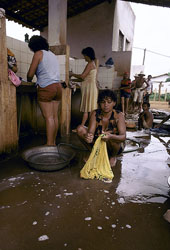News
 Many water and sanitation utilities in Brazil are finding it hard to meet rising operating costs, with limited tariff increases, and the need to expand services. In the last 10 years, utility firms have embarked on improving their operations, investing in service expansion, reducing water losses, improving energy efficiency, and thereby reducing their energy costs.
Many water and sanitation utilities in Brazil are finding it hard to meet rising operating costs, with limited tariff increases, and the need to expand services. In the last 10 years, utility firms have embarked on improving their operations, investing in service expansion, reducing water losses, improving energy efficiency, and thereby reducing their energy costs.
Three Brazilian cities are highlighted in this story for significantly increasing access to clean water for their citizens, especially for low-income households with little or no significant increase of water production and energy consumption. All utility firms listed below financed their own energy efficiency investments leading to large reductions in water leakages and significant energy savings.
These three water and sanitation utilities represent different ownership and operating conditions:
- SANASA - City of Campinas, State of Sao Paulo,
- SANEATINS - State of Tocantins, and
- Aguas do Imperador - City of Petropolis, State of Rio de Janeiro.
The experience of these Brazilian water and sanitation utilities and the cohorts they represent suggest that:
- Synergy between energy efficiency and water loss reduction activities could be more explicitly pursued to achieve greater system benefits;
- Market signals, such as electricity rate levels and structures, determine the utilities’ level of efforts and choice of options in controlling energy cost;
- Commitment from the highest management level is critical to sustained effort on improving energy management. Such commitment also needs to be reinforced through low-cost measures that achieve significant cost savings in the short term;
- Systematic energy efficiency efforts require institutionalizing monitoring and evaluation to establish baseline for investments and to ensure that short-term savings are not eroded; and
- All the above could be significantly strengthened by more explicit assistance (know-how and financing) from the government and multilateral development banks.
The Energy Sector Management Assistance Program (ESMAP), is working with the Water and Sanitation Program (WSP) and the Water Anchor of the World Bank to promote and scale up energy efficiency in water and sanitation utilities through its Energy Efficient Cities Initiative (EECI). The three Brazilian water and sanitation utilities case studies will contribute to the growing knowledge base of EECI on the water and sanitation sector, which also includes case studies from South Africa and Mexico, and more.
An operation guidance note on energy efficiency for water and sanitation utilities is being prepared by a team of experts from ESMAP, WSP and the World Bank Water Anchor. The guidance note is expected to be ready for dissemination before the end of this year.
